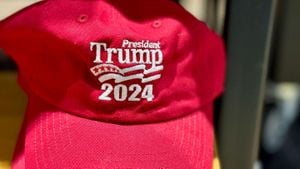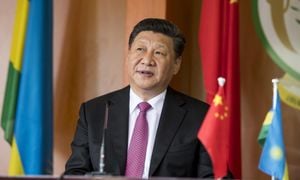Donald Trump is already making headlines as he outlines his ambitious plans for Day One of his second term as President, stirring both excitement and apprehension among various groups. His list is extensive and bold, highlighting key issues he campaigned on during the lead-up to the election. Let's take a closer look at what these plans entail and what they might mean for America.
From his own statements, Trump has indicated he won't waste any time once he steps back inside the White House. One of his first actions would be the resumption of mass deportations of migrants. Trump has emphasized the need to secure the nation’s borders, stating, “I want to close the border, and I want to drill, drill, drill.” Clearly, this reflects his long-standing commitment to immigration reform, but how this would be implemented remains to be seen.
Another significant focus of Trump's Day One agenda is rolling back policies from the Biden administration, particularly those concerning education. This fits within the broader Republican strategy to alter or dismantle educational reforms and protections put forth during Biden's tenure. Whether these changes will fulfill the expectations of his base or lead to greater backlash against his administration is open for debate.
But the plans don’t stop there. Trump intends to shake up the federal bureaucracy by targeting employees he suspects of being unsupportive or even hostile to his agenda. He has suggested he might fire thousands of federal employees, alleging they are secretive operatives working against him. This part of his agenda echoes previously voiced sentiments about the so-called “deep state,” which Trump has repeatedly claimed thwarts his policies from within the government.
Even more controversially, Trump aims to pardon individuals convicted for their roles during the Capitol riot on January 6, 2021. During his campaign, he has repeatedly called these defendants “unbelievable patriots,” indicating his desire to help them out as soon as he can. This raises important questions about not only the morality but also the legality of such pardons. Historically, presidential pardons have been used to show mercy, but with this specific intent, it shows Trump’s inclination to reconnect with his core supporters.
Accompanying these criminal pardons would be the firing of Jack Smith, the special counsel responsible for prosecuting two high-profile federal cases against Trump—charges involving attempts to overturn the 2020 election results and unlawful retention of classified documents. The statement about firing Smith almost immediately upon taking office shows Trump's stark desire to control the legal narrative surrounding him. Interestingly, prosecutors have historically faced significant limitations when it came to pursuing sitting presidents, and Trump's lawyers seem to exploit those ambiguities as they prepare for potential battles over his convictions.
Trump's approach also includes reshaping the federal workforce, which might involve using a 2020 executive order, "Schedule F," aimed at giving political bosses the power to convert career posts to political ones almost at will. This tactic might strip thousands of career civil servants of their protections, allowing for a quick reallocation of positions to loyalists. While Trump would argue this is necessary for accountability and loyalty, critics would see it as undermining the integrity of the public service.
What does all this mean for citizens? While Trump emphasizes these plans will restore the country’s strength and effectiveness, his critics warn they could exacerbate divides and set precedents for power misuse. Policies surrounding immigration, law, and civil service rest at the heart of American democracy, and any major shifts could leave lasting impacts well beyond Trump's presidency.
Critics and supporters alike are preparing for how this Day One agenda might manifest when Trump returns to the Oval Office. The political atmosphere is charged, and as Trump sets the stage for his policies using decisive language and unwavering resolve, the stakes for everyday Americans couldn’t be higher. Groups advocating for civil rights, immigration reform, and government accountability are already mobilizing, knowing their voices will play any role as citizens navigate this new chapter of American governance.
Though Trump’s ambitions for Day One may seem overwhelming, they also present opportunities for deep discussions about democracy and governance. How much power should one president wield? What role do citizens play when faced with controversial executive actions? These questions will echo throughout the country as we watch Trump’s return to power on the horizon, promising to reshape the fabric of American political life.



